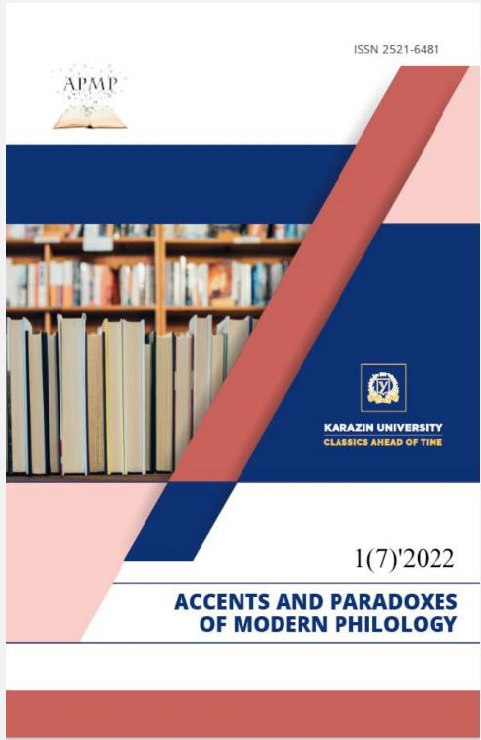POSTMODERNIST CONCEPTIONS OF TEXT AND WRITING IN CREATIVE WORKS BY MARGUERITE DURAS
Abstract
This article is dedicated to the analysis of literature quests to find new expressive capabilities of the word in author’s speaking of the French writer of the XX century Marguerite Duras.
Creative activity of Duras is considered in the context of postmodern concepts of R. Barthes, M. Foucault, J. Derrida which cast aside logocentric cultural tradition of modernism epoch.
In her search for new expressive capabilities of language and writing the female writer encounters difficulties which she herself calls serious drawbacks, bearing in mind the complexity of overcoming inconsistency between the act of speaking and the expressed sense. After all, experience of the world and existence of human in it is absolutely unique, whereas language refers to abstract categories. Thereby, metaphysic dissociation of the human and the world occurs, as this connection may be implemented only indirectly. As a result, language proves to be incapable of expressing reality directly. Text setting of fiction books by Duras reflects the concept of feminine writing which connects literature quests of
the female writer with the problems of the feminist theory, the objective whereof is justification of full-fledged rights and equivalence of the existence of various cultures and practices, including alternative ones to the dominating masculine discourse, feminine way of life in the world, feminine thinking, feminine writing. As a woman-author M. Duras comes forward as the creator of her own system of meanings, where principles of dissociation and multi-dimensionality are postulated instead of hierarchy. Having elaborated her peculiar style of writing, Marguerite Duras managed to reach those boundaries where dissociation between language and reality is overcome. Using existing lexical means and stylistic approaches, while shifting accents and deconstructing them, Duras has reached high creative excellence in her quests for new expressive capabilities of the language and the writing. Her texts create space where the essence is not grasped, but created instead, and due to this they are born in the process of their apprehension, active co-creation where the reader acts as co-author
Downloads
References
Barthes R. (1989). Pleasure from the text. Semiotics. Poetics. Moskva: Progress (in Rus).
Zherebkina I. (2000). Read my desire. Moskva. (in Rus).
Duras M. (1987). La vie matérielle. Paris : P.O.L. a.
Duras M. (1985). Écrire, dit-elle. Imaginaires de Marguerite Duras. Bruxelles : Éditions de l’Université de Bruxelles.
Duras M. Moderato cantabile. URL : https://1001ebookgratuit.com/lire-moderatocantabile-1-gratuit-chapitre
Duras M. Le vice-consul URL : https://booksonline.com.ua/view.php?book=117363
Duras M. Le ravissement de Lol V. Stein. URL : https://www.pdfdrive.com/le-ravissementde-lol-v-stein-e34070262.html
Duras M. (1993). Écrire. Paris : Gallimard.
Derrida J. (2000). Violence and metaphysics. Writing and difference. Moskva: Akаdemicheskiy projekt. (in Rus).
Duras M. (1967). Entretien de Marguerite Duras avec Jean Schuster. L’Archibras, n°2. Paris : Le Terrain Vague.
Dorosh O. (2006). Linguocognitive and communicative aspects author’s feminine language in M. Duras’s novel. Avtoref. dys….kand. filolohichnyh nauk. Kyiv. (in Ukr).
Duras M. (2009). Lover. Kyiv: A-ba-ba-ha-la-ma-ha. (in Ukr).
Lakoff R. (2000). Language and a woman’s place. Gendernyie issledovaniya. № 5. (in Rus).
Foucault M. (1991). Hermeneutics of subject. Kurs liektsyi v Kolezh de Frans. Moskva: Progress. (in Rus).
Foucault M. (1993). The order of discourse. Kyiv. (in Ukr).
Foucault M. (1977). Words and things. Moskva: Progress. (in Rus).




